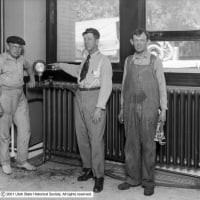Welcome! Here are the website rules, as well as some tips for using this forum.
Need to contact us? Visit https://heatinghelp.com/contact-us/.
Click here to Find a Contractor in your area.
If our community has helped you, please consider making a contribution to support this website. Thanks!
Series 100 pump vibrating and noisy
Options
realolman
Member Posts: 513
What should be done about a series 100 B and G pump that vibrates and makes a good bit of noise throughout the house?
Is there any point in messing with couplings, motor mounts, and bearings, or would it be better to just get a new pump?
Is there any point in messing with couplings, motor mounts, and bearings, or would it be better to just get a new pump?
0
Comments
-
Re: Series 100 pump vibrating and noisy
You could replace the coupling and mounts and if the bearing assembly is the culprit you could replace that too. Personally I’d consider updating the circulator to a water lubricated maintenance free style, like a Taco.There was an error rendering this rich post.
0 -
Coupler
I would try changing the coupler first. They are inexpensive and only take a few minutes to change. Coupler wear is usually caused by sagged rubber mounts on the motor. When you have the motor out, check and see if they are concentric with the shaft. Unless it has not been oiled regularly, bearings are not usually a problem and when they do, the seal will typically start to leak. The nice thing about the 100's is that they can usually be repaired without touching the water side, which is especially important if you do not have isolation valves. They can basically be rebuilt forever. The 100 in my parents house is original, 55 years old and has only required one mount and coupler change.
The other option is to replace it with something like a Taco 007. Maintainance free and very quiet. If you have isolation valves on the piping to the pump, this is fairly easy to do as it will mount on the 100 flanges without modification. If you have to drain the entire system to replace the pump, it may be easier to try to repair the 100 before considering replacement.0 -
And,
it should be said that the deterioration of motor mounts is primarily due to over-oiling.8.33 lbs./gal. x 60 min./hr. x 20°ΔT = 10,000 BTU's/hour
Two btu per sq ft for degree difference for a slab0 -
Over oiling...
My old heating system had a big-looking circulator on it (3 piece, I think they are called), and the decals on it said to oil the circulator with 20 drops of oil per month and the motor 10 drops per month. After a year, the maintenance man told me that was way too much, and to try 10 drops once a year for the circulator and 5 drops a year for the motor. That worked for almost 30 years.
So one reason for overoiling is the decal on the circulator itself. I wonder why they recommended so much oil?0 -
sounds
if it at all sounds like the motor is where the noise is coming from, then run it for a second while the pump is off the bearing assy and see if the noise really is the motor. I have 6 or so out in the garage from the past couple years that were replaced but did not get recycled.
TimJust a guy running some pipes.0 -
Oiling
It really depends on how the pump is used. A pump only used during the heating season for a few hours a day will need very little oil. On the other hand, a pump running continuously with very hot water may need monthly oiling. The manufacturers recommendation may be based on this worst case scenario.
Before oiling, I usually remove the cover from the bearing assembly and see if the wicking is saturated and there is still some liquid oil at the bottom. The motor bearings can't really be checked, but if the pump bearings are dry, you can probably assume the motor bearings are in the same condition.0 -
questions..
What's the application (domestic hotwater or closed loop heating)?
What color is the pump (red or gold)?
How long has the pump been installed?0
This discussion has been closed.
Categories
- All Categories
- 87.3K THE MAIN WALL
- 3.2K A-C, Heat Pumps & Refrigeration
- 61 Biomass
- 429 Carbon Monoxide Awareness
- 120 Chimneys & Flues
- 2.1K Domestic Hot Water
- 5.8K Gas Heating
- 115 Geothermal
- 166 Indoor-Air Quality
- 3.7K Oil Heating
- 77 Pipe Deterioration
- 1K Plumbing
- 6.5K Radiant Heating
- 395 Solar
- 15.7K Strictly Steam
- 3.4K Thermostats and Controls
- 56 Water Quality
- 51 Industry Classes
- 50 Job Opportunities
- 18 Recall Announcements



